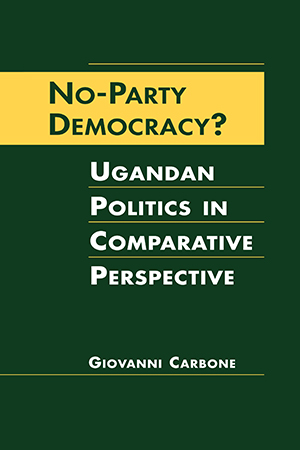
- 2008/259 pages
- Related titles: Museveni's Uganda by Aili Mari Tripp and Decentralization in Uganda by Gina M.S. Lambright
No-Party Democracy? Ugandan Politics in Comparative Perspective
Hardcover: $62.00
ISBN: 978-1-58826-630-9
Ebook: $62.00
ISBN: 978-1-62637-117-0
Are political parties an essential element of democracy? Or can a no-party system constitute a viable democratic alternative? Giovanni Carbone examines the politics of Museveni’s Uganda to illustrate the achievements, contradictions, and limitations of participatory politics in the absence of partisan organizations.
At a time when multiparty reforms were sweeping the globe, Uganda opted for a controversial, no-party democratic model. The country’s politics over the past two decades thus provide the perfect opportunity for addressing the many questions—theoretical, empirical, and comparative—that the notion of a no-party system of elected government raises. Carbone’s analysis of how a no-party electoral regime actually works (or doesn’t) in Uganda fills a gap in both democracy studies and the study of African politics.
At a time when multiparty reforms were sweeping the globe, Uganda opted for a controversial, no-party democratic model. The country’s politics over the past two decades thus provide the perfect opportunity for addressing the many questions—theoretical, empirical, and comparative—that the notion of a no-party system of elected government raises. Carbone’s analysis of how a no-party electoral regime actually works (or doesn’t) in Uganda fills a gap in both democracy studies and the study of African politics.







